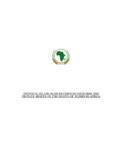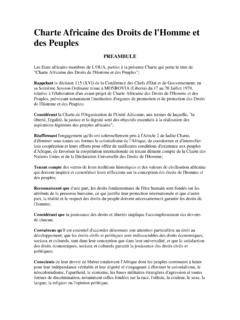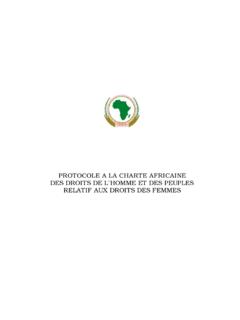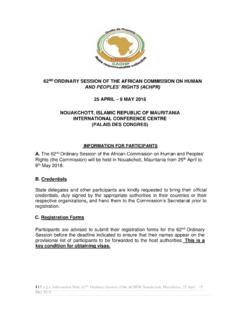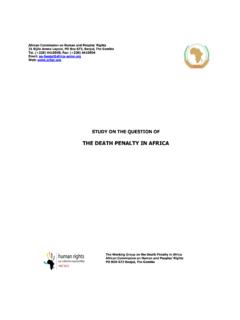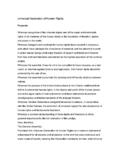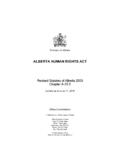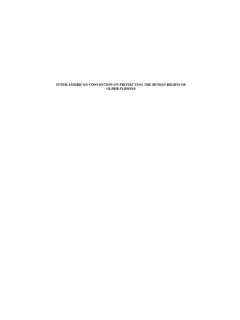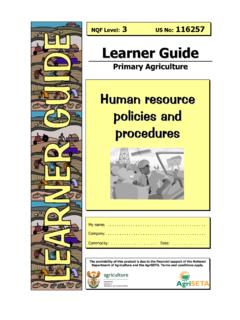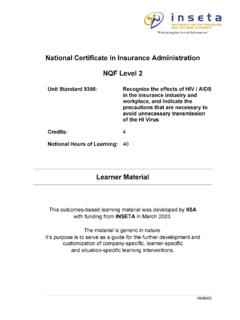Transcription of AFRICAN (BANJUL) CHARTER ON HUMAN AND …
1 1 AFRICAN (BANJUL) CHARTER ON HUMAN AND PEOPLES' rights (Adopted 27 June 1981, OAU Doc. CAB/LEG/67/3 rev. 5, 21 58 (1982), entered into force 21 October 1986) Preamble The AFRICAN States members of the Organization of AFRICAN Unity, parties to the present convention entitled " AFRICAN CHARTER on HUMAN and Peoples' rights ", Recalling Decision 115 (XVI) of the Assembly of Heads of State and Government at its Sixteenth Ordinary Session held in Monrovia, Liberia, from 17 to 20 July 1979 on the preparation of a "preliminary draft on an AFRICAN CHARTER on HUMAN and Peoples' rights providing inter alia for the establishment of bodies to promote and protect HUMAN and peoples' rights "; Considering the CHARTER of the Organization of AFRICAN Unity, which stipulates that "freedom, equality, justice and dignity are essential objectives for the achievement of the legitimate aspirations of the AFRICAN peoples".
2 Reaffirming the pledge they solemnly made in Article 2 of the said CHARTER to eradicate all forms of colonialism from Africa, to coordinate and intensify their cooperation and efforts to achieve a better life for the peoples of Africa and to promote international cooperation having due regard to the CHARTER of the United Nations. and the Universal Declaration of HUMAN rights ; Taking into consideration the virtues of their historical tradition and the values of AFRICAN civilization which should inspire and characterize their reflection on the concept of HUMAN and peoples' rights ; Recognizing on the one hand, that fundamental HUMAN rights stem from the attributes of HUMAN beings which justifies their national and international protection and on the other 2 hand that the reality and respect of peoples rights should necessarily guarantee HUMAN rights ; Considering that the enjoyment of rights and freedoms also implies the performance of duties on the part of everyone.
3 Convinced that it is henceforth essential to pay a particular attention to the right to development and that civil and political rights cannot be dissociated from economic, social and cultural rights in their conception as well as universality and that the satisfaction of economic, social and cultural rights ia a guarantee for the enjoyment of civil and political rights ; Conscious of their duty to achieve the total liberation of Africa, the peoples of which are still struggling for their dignity and genuine independence, and undertaking to eliminate colonialism, neo-colonialism, apartheid, zionism and to dismantle aggressive foreign military bases and all forms of discrimination, particularly those based on race, ethnic group, color, sex. language, religion or political opinions; Reaffirming their adherence to the principles of HUMAN and peoples' rights and freedoms contained in the declarations, conventions and other instrument adopted by the Organization of AFRICAN Unity, the Movement of Non-Aligned Countries and the United Nations; Firmly convinced of their duty to promote and protect HUMAN and people' rights and freedoms taking into account the importance traditionally attached to these rights and freedoms in Africa; Have agreed as follows: Part I: rights and Duties Chapter I: HUMAN and Peoples' rights Article 1 The Member States of the Organization of AFRICAN Unity parties to the present CHARTER shall recognize the rights , duties and freedoms enshrined in this Chapter and shall undertake to adopt legislative or other measures to give effect to them.
4 Article 2 Every individual shall be entitled to the enjoyment of the rights and freedoms recognized and guaranteed in the present CHARTER without distinction of any kind such as race, ethnic group, color, sex, language, religion, political or any other opinion, national and social origin, fortune, birth or other status. 3 Article 3 1. Every individual shall be equal before the law. 2. Every individual shall be entitled to equal protection of the law. Article 4 HUMAN beings are inviolable. Every HUMAN being shall be entitled to respect for his life and the integrity of his person. No one may be arbitrarily deprived of this right. Article 5 Every individual shall have the right to the respect of the dignity inherent in a HUMAN being and to the recognition of his legal status. All forms of exploitation and degradation of man particularly slavery, slave trade, torture, cruel, inhuman or degrading punishment and treatment shall be prohibited.
5 Article 6 Every individual shall have the right to liberty and to the security of his person. No one may be deprived of his freedom except for reasons and conditions previously laid down by law. In particular, no one may be arbitrarily arrested or detained. Article 7 1. Every individual shall have the right to have his cause heard. This comprises: (a) the right to an appeal to competent national organs against acts of violating his fundamental rights as recognized and guaranteed by conventions, laws, regulations and customs in force; (b) the right to be presumed innocent until proved guilty by a competent court or tribunal; (c) the right to defense, including the right to be defended by counsel of his choice; (d) the right to be tried within a reasonable time by an impartial court or tribunal. 2. No one may be condemned for an act or omission which did not constitute a legally punishable offence at the time it was committed.
6 No penalty may be inflicted for an offence for which no provision was made at the time it was committed. Punishment is personal and can be imposed only on the offender. Article 8 4 Freedom of conscience, the profession and free practice of religion shall be guaranteed. No one may, subject to law and order, be submitted to measures restricting the exercise of these freedoms. Article 9 1. Every individual shall have the right to receive information. 2. Every individual shall have the right to express and disseminate his opinions within the law. Article 10 1. Every individual shall have the right to free association provided that he abides by the law. 2. Subject to the obligation of solidarity provided for in 29 no one may be compelled to join an association. Article 11 Every individual shall have the right to assemble freely with others. The exercise of this right shall be subject only to necessary restrictions provided for by law in particular those enacted in the interest of national security, the safety, health, ethics and rights and freedoms of others.
7 Article 12 1. Every individual shall have the right to freedom of movement and residence within the borders of a State provided he abides by the law. 2. Every individual shall have the right to leave any country including his own, and to return to his country. This right may only be subject to restrictions, provided for by law for the protection of national security, law and order, public health or morality. 3. Every individual shall have the right, when persecuted, to seek and obtain asylum in other countries in accordance with laws of those countries and international conventions. 4. A non-national legally admitted in a territory of a State Party to the present CHARTER , may only be expelled from it by virtue of a decision taken in accordance with the law. 5 5. The mass expulsion of non-nationals shall be prohibited. Mass expulsion shall be that which is aimed at national, racial, ethnic or religious groups.
8 Article 13 1. Every citizen shall have the right to participate freely in the government of his country, either directly or through freely chosen representatives in accordance with the provisions of the law. 2. Every citizen shall have the right of equal access to the public service of his country. 3. Every individual shall have the right of access to public property and services in strict equality of all persons before the law. Article 14 The right to property shall be guaranteed. It may only be encroached upon in the interest of public need or in the general interest of the community and in accordance with the provisions of appropriate laws. Article 15 Every individual shall have the right to work under equitable and satisfactory conditions, and shall receive equal pay for equal work. Article 16 1. Every individual shall have the right to enjoy the best attainable state of physical and mental health.
9 2. States parties to the present CHARTER shall take the necessary measures to protect the health of their people and to ensure that they receive medical attention when they are sick. Article 17 1. Every individual shall have the right to education. 2. Every individual may freely, take part in the cultural life of his community. 3. The promotion and protection of morals and traditional values recognized by the 6 community shall be the duty of the State. Article 18 1. The family shall be the natural unit and basis of society. It shall be protected by the State which shall take care of its physical health and moral. 2. The State shall have the duty to assist the family which is the custodian or morals and traditional values recognized by the community. 3. The State shall ensure the elimination of every discrimination against women and also ensure the protection of the rights of the woman and the child as stipulated in international declarations and conventions.
10 4. The aged and the disabled shall also have the right to special measures of protection in keeping with their physical or moral needs. Article 19 All peoples shall be equal; they shall enjoy the same respect and shall have the same rights . Nothing shall justify the domination of a people by another. Article 20 1. All peoples shall have the right to existence. They shall have the unquestionable and inalienable right to self- determination. They shall freely determine their political status and shall pursue their economic and social development according to the policy they have freely chosen. 2. Colonized or oppressed peoples shall have the right to free themselves from the bonds of domination by resorting to any means recognized by the international community. 3. All peoples shall have the right to the assistance of the States parties to the present CHARTER in their liberation struggle against foreign domination, be it political, economic or cultural.
